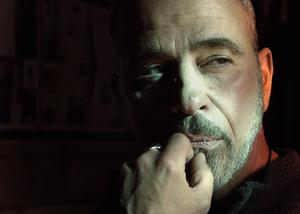 Like a lot of people, John Martoccia got caught up in the world’s definition of success when he was younger, so he didn’t make room for God in his life. That changed after John had a conversion experience which led him to becoming a more Christ-centered person. He even felt called to become a filmmaker to tell a story inspired by his own experiences. That movie, called “Vito Bonafacci,” is now being discussed as part of the Patheos Movie Club. I interviewed John last year about the film and his spiritual journey. Here’s what he had to say:
Like a lot of people, John Martoccia got caught up in the world’s definition of success when he was younger, so he didn’t make room for God in his life. That changed after John had a conversion experience which led him to becoming a more Christ-centered person. He even felt called to become a filmmaker to tell a story inspired by his own experiences. That movie, called “Vito Bonafacci,” is now being discussed as part of the Patheos Movie Club. I interviewed John last year about the film and his spiritual journey. Here’s what he had to say:
TR: What is your spiritual background? Were you raised Catholic and then drifted away from the faith, or was it never particularly important in your home?
JM: I went through Confirmation, but in our family there was no Mass attendance, no prayer before dinner. It was a secularized Catholic background.
TR: I’ve interviewed a number of people who either didn’t think much about God – or if they did, it was very much on the surface of their lives. Then they had something happen to them that was like God hitting them with a spiritual two-by-four, something that may have been a tough experience but ultimately deepened their faith lives. Has God ever hit you with a spiritual two-by-four?
JM: Most definitely. Within a two-year period, I went through a divorce, my father died of a brain tumor, my mother became mentally ill after my father’s death. She was in and out of psychiatric hospitals. I had some problems with the IRS. I was separated from my kids because of the divorce. It was a lot of adversity in a short period of time. The things that were most important to me were slipping away.
TR: So how did God insert His way into that situation?
JM: At the time I started drinking heavily. Over time though, I started to dig deep into my soul. I began painting. Through the painting and digging deep into my soul, I started to look up. I came to accept the truths of God. You know, Scripture says, “The proud in spirit will be brought low.” I was very proud. The Bible also says, “The lowly in spirit will be exalted.” Through the lowliness, I looked up towards God. That was the beginning.
TR: The basics of the story of “Vito Bonafacci” sound like they found their seeds in your own life. What are the basics of Vito’s story and how it relates to you?
JM: Vito is essentially going through the world thinking that what he needs to be happy are the things of the world: success, money, power, status, the material possessions that go with what society conditions us to believe that we need. Then he has this dream, which is like a death experience, and he comes to realize there’s something more important than the material realm. He digs into his soul and begins his conversion.
TR: One of the struggles that people of faith have is sharing that faith with others in a way that takes root in them. Looking back on your own life, was there any approach that the agnostic version of yourself would have listened to that would have made you take God more seriously back then – or did you have to go through the suffering and the creative process?
JM: When I look back, I think the examples of good people in my life like my mother and father [made a difference]. I don’t think when I was younger that preaching would have worked. Even though my parents did not practice their faith, they were good, solid, hard-working, honest people. It was that example along with the prayers of others who loved me that brought me [to God]. Obviously, it would have been nice if I was introduced through my parents to going to Mass, but for whatever reason, that didn’t happen in my life. But I know people who were brought up as practicing Catholics with very devout parents – and they’ve left the faith. So it’s relative. This is the road the good Lord has chosen for me.
TR: Sometimes when people undergo a conversion like you did, the people around them aren’t always on board. Some people can lose friends. Did you lose any friends or family once you started taking the faith seriously?
JM: In my situation, the opposite happened. I think that through my faith, people saw a transformation, they saw a person that was better than the old person. Instead of repelling people like I used to, I started attracting people. I have better relationships with family members, I have tons of Catholic and non-Catholic friends now. And that’s the thing that really overwhelms me…When my father died before I had faith, I got very little response from friends, very few Mass cards. After my conversion when my mother died, I had tons of friends show up and I got Mass cards. I was overwhelmed. I wondered, “Where did all these friends come from?” …God has really blessed me with tremendous people. They support me, they pray for me, and I feel God’s love through the community.
TR: You talked earlier about how the creative process helped you find God. You did it through your painting. When you see a project like “Vito Bonafacci,” what do you hope the audience gets out of it? Is it primarily for Catholics or could it generate wider interest?
JM: I would hope it would generate wider interest. Redemption is a universal theme, so I think the call to understand something beyond our temporal existence is universal to all faiths and even people without faith…What motivated this character to go through this transformation? What motivates people to seek a higher calling? This story is a conversion through the eyes of a Catholic. Hopefully it will get other people to question the purpose of their existence.
 This post is part of the Patheos Movie Club for “Vito Bonafacci,” a sponsored conversation in partnership with the filmmakers.
This post is part of the Patheos Movie Club for “Vito Bonafacci,” a sponsored conversation in partnership with the filmmakers.











